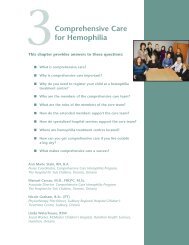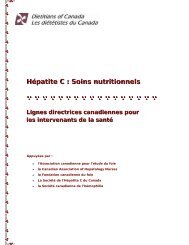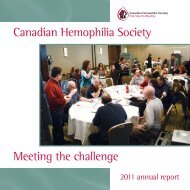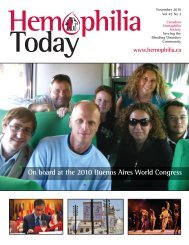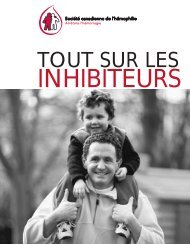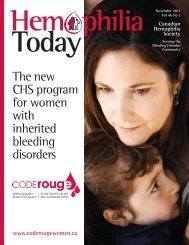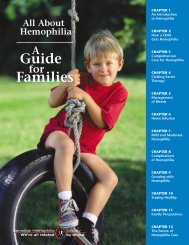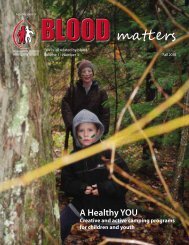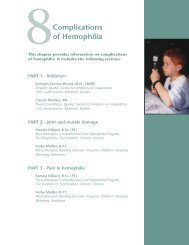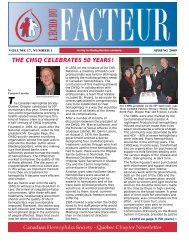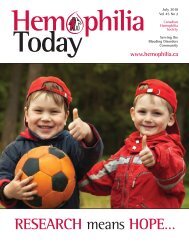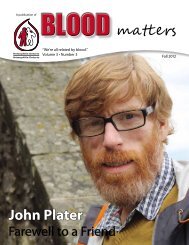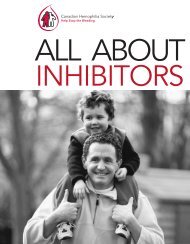Canadian Hemophilia Society
Canadian Hemophilia Society
Canadian Hemophilia Society
Create successful ePaper yourself
Turn your PDF publications into a flip-book with our unique Google optimized e-Paper software.
A Global Perspective<br />
Quebec-Nicaragua twinning project<br />
September 2012 assessment visit<br />
François Laroche, president of the CHS - Quebec Chapter<br />
PROLOGUE: On the flight from Houston, Texas, to<br />
Managua, Nicaragua, on September 15, I confided<br />
to Geneviève Beauregard, program and operations<br />
manager of the Quebec Chapter of the CHS (CHSQ), that<br />
I had mixed feelings about our trip to Nicaragua, a<br />
country about which we then knew very little. Though<br />
this was my third organization twinning assessment visit,<br />
I was outside my comfort zone, as all the discussions were<br />
going to take place in Spanish and I speak very little<br />
Spanish. I was reassured, however, by Geneviève and Luisa<br />
Nicaragua Association of <strong>Hemophilia</strong> Board of Directors with CHSQ<br />
representatives, Geneviève Beauregard and François Laroche.<br />
Durante (World Federation of <strong>Hemophilia</strong> [WFH] Regional Program Manager, Americas, who was also accompanying<br />
us on this voyage), both of whom are Spanish-speaking and who promised to be my interpreters.<br />
We spent three extremely busy days, September 16, 17 and 18,<br />
visiting hospitals, the premises of the Red Cross, and attending<br />
meetings not only with the board of directors of the Nicaraguan<br />
Association of <strong>Hemophilia</strong> (NAH) but also with patients and their<br />
families, the executive director and the president of the Red Cross<br />
and even the secretary general of the National Blood Authority of<br />
Nicaragua’s department of health. Here is what we learned:<br />
▪ Nicaragua has a public health system and all citizens have access<br />
to free care in hospital. For the more affluent, there are several<br />
private hospitals with superior equipment and services.<br />
▪ Care for hemophiliacs is provided by the Red Cross (a private<br />
humanitarian agency funded mainly by donations from other<br />
countries), as this is where the expertise is—the director general<br />
of the Red Cross is a hematologist specializing in hemostasis. Also,<br />
the Red Cross provides meals and accommodations on weekdays<br />
for hemophiliacs experiencing bleeds.<br />
▪ Care is very rudimentary: generally fresh frozen plasma and<br />
cryoprecipitate. Small amounts of factor concentrates are<br />
occasionally available, when donations arrive from the WFH.<br />
▪ There is no multidisciplinary team (not even a physiotherapist),<br />
but a dentist is available part time to provide dental care.<br />
▪ Hospital care for hemophiliacs is completely inadequate (lack of<br />
expertise in hemostasis).<br />
▪ Diagnostic errors are numerous, due to lack of training but also<br />
sometimes due to shortage of reagents needed to adequately<br />
perform and interpret tests.<br />
▪ <strong>Hemophilia</strong>cs, their families and the director general of the Red<br />
Cross would like to set up a hemophilia treatment centre on the<br />
Red Cross premises.<br />
▪ Our first impression is that the Minister of Health would prefer<br />
hemophiliacs be treated through the public system, that is, in<br />
hospitals.<br />
▪ The director general of the Red Cross is extremely sympathetic to<br />
the cause of hemophiliacs and wants to provide them the best<br />
possible care.<br />
▪ The members of the board of directors of the NAH are very<br />
motivated to get things moving.<br />
The main objective of the twinning partnership will be to help the<br />
NAH do the following:<br />
▪ Build a solid organizational structure<br />
▪ Increase the association’s ability to lobby department of health<br />
authorities<br />
▪ Organize educational workshops for association members<br />
▪ Advocate for better care for the country’s hemophiliacs<br />
As these objectives seem realistic, we developed an appropriate<br />
action plan. We have high hopes that with the backing and<br />
financial support of the WFH, the CHSQ–NAH organizational<br />
twinning will generate many fine achievements and be crowned<br />
with success at the end of its four-year term.<br />
In closing, I would like to thank Geneviève Beauregard and Luisa<br />
Durante for their commitment and their outstanding contributions<br />
throughout this assessment visit. And I also want to extend<br />
heartfelt thanks to Javier, Engels, Dr. Berrios, Jose (our chauffeur)<br />
and the entire NAH team for their warm welcome and their<br />
collaboration throughout our stay.<br />
¡Hasta la proxima!<br />
Twinning partnership suspended<br />
Due to the socio-political situation in Egypt, it is with much<br />
regret that both the Egyptian <strong>Society</strong> of <strong>Hemophilia</strong> and the<br />
<strong>Canadian</strong> <strong>Hemophilia</strong> <strong>Society</strong> have agreed to end their<br />
twinning partnership. – C.R.<br />
22 | <strong>Hemophilia</strong> Today November 2012



